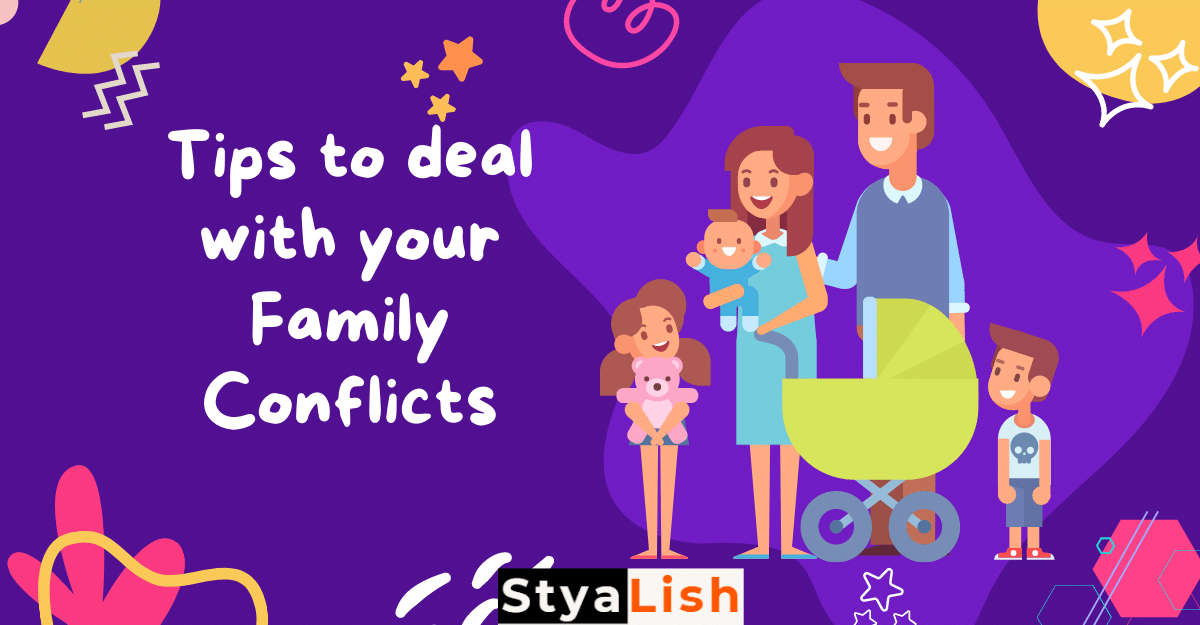INTRODUCTION
Being a family member can be quite advantageous because it provides you with support, love, and security. You may overcome many of life’s obstacles with the aid of family members who love and understand you. Conflict, though, can occur from time to time. Family members frequently argue with one another. While disagreements are generally normal, healthy, and unavoidable, they can become serious when they go unresolved or intensify. Being a family member can be quite advantageous because it provides you with support, love, and security. You may overcome many of life’s obstacles with the aid of family members who love and understand you. Conflict is possible from time to time, though. These are the tips to deal with your family conflicts.
If you can concentrate on addressing your end of the disagreement in a peaceful way, even if everyone else ignores this advice, you can significantly reduce fights during family gatherings and foster harmony. You might be amazed by how much of a difference this can make in the atmosphere of your family gatherings as well as in your own feelings and stress level in the weeks leading up to them. You have three choices for the future.
TIPS TO DEAL WITH YOUR FAMILY CONFLICTS
1. Family duties

Responsibilities are another common cause of family disagreements. The way family members split up domestic duties and other responsibilities might lead to misunderstandings. For instance, disagreements may arise about who is responsible for caring for young children or elderly family members. Although though these disputes are frequently minor, if they are not settled, they could persist for a very long period.
2. Be present and direct

You should be aware that anyone attempting to incite confrontation has the potential to easily trigger your emotions and even cause bodily reactions such as an increase in heart rate and blood pressure. A fight-or-flight reaction always results in becoming defensive, so try to avoid entering that mode. A disagreement or tense conversation is not what you desire. Maintain your integrity and remain true to yourself. When communicating, be direct and assertive. Focus on your response and don’t waver. Be aware of when a conversation or debate has advanced to the point of no return, which indicates that the focus is no longer on resolving the problem but rather on winning. Stop the interaction and walk away if it reaches this point.
3. Giving benefit to doubt

Giving family members the benefit of the doubt is a crucial component of effective conflict management, and a family provides many opportunities to test your abilities in this regard. For instance, don’t just blame yourself if your partner is late by saying, “She just drives me crazy.” The reason for this is that there are several explanations that are irrelevant to you. Give them the benefit of the doubt and believe them if the behaviour is unusual rather than getting irritated and causing family strife.
4. Your own well- being come first

While it’s important to show others the utmost respect and consideration, you shouldn’t go above and beyond or tangle up yourself in unnecessary knots to appease someone else or maintain peace. Never allow any personal encounter or relationship to impinge on or threaten your wellbeing. See your boundaries as the barrier between you and another person. Unless you extend an invitation, no one has the right to be in your area. Spend time with people you get along with, who care about you and are there to support you.
5. Target the problem, not the person

It’s crucial to use caution when defending oneself if a family member accuses you of doing anything. Even though it might help you make a solid point, it is not a good idea to hurt other people. It would not be polite to confront the other person if you can recall a time when they behaved exactly what they accuse you of. If you have no other option, you should not bring it up. Then, you should make sure to act respectfully.
6. Setting boundaries, holding your values

It’s possible that you came from a culture were ignoring conflict, hiding issues, or refusing to deal with the tough issues is common. To put your principles into practise and maintain your boundaries, you should address the conflicts you encounter. Maintaining your boundaries may entail explaining your motivation for resolving the problem to the other parties if they refuse to do so or threaten you for doing so. This is one of the best tips to deal with your family conflicts. Then, insist that your experience is accurate and outline what it might be like for you to continue to be friends with them in the future so that you can get better. Name the conflicts as you see them, being clear, considerate, and firm.
7. Talk with wise people

Discuss your experience with a knowledgeable someone who is not a part of your family structure. Explaining our experience to someone who is not involved in the problem as much as we are is helpful. Ask their advice. A wise person or qualified counsellor can help you respond to problems properly and can mentor you in the use of constructive conflict-resolution techniques.
8. Listen

That doesn’t imply you should remain silent and wait for the other person to finish speaking. You must pay attention to your 13-year-old daughter, no matter how irate she makes you feel by demanding that she be permitted to wear a miniskirt. Always consider other people’s perspectives. This is one of the best Tips to deal with your family conflicts. Likewise, resist the need to let your feelings rule your judgement. May I talk to you? Do your husband and children feel they must yell to get your attention because you are so immersed in work? Do not forget that listening is a show of strength, not weakness; listening does not imply obeying. Tell what you heard again.
9. Avoid Interruption

A person experiences a sense of emptiness when their opinions are not properly considered or when they are not heard. Families must ensure that everyone is given a fair chance to voice their opinions and that they are all given a proper hearing without interruptions to avoid conflict. It is a small but thoughtful act that demonstrates your value for your family members and your will to put their needs ahead of all other considerations. This is one of the best Tips to deal with your family conflicts.
10. Recognize that some issues aren’t worth fighting for

Not every disagreement is worthwhile. Consider whether it would be worth getting into a fight over something as insignificant as your partner or children failing to put the trash out, for instance. Keep in mind that mistakes can be made, accidents can occur, and not everything is done to purposely harm you. This does not imply, however, that you should put up with harmful or abusive behaviour. And if you frequently restrain yourself out of concern for other family members, you have every right to be worried and to speak up.
CONCLUSION
Although while family disputes can be extremely upsetting and stressful, it is frequently feasible to find a constructive solution. Never forget to wait until things have calmed down before thinking about other family members. It is worthwhile to work on your conflict-resolution abilities because they can benefit you in many aspects of your life. Check with everyone to see if they agree with the final decision before implementing it. The members must maintain a strong bond of love and trust. You can get everyone’s signature if there is a contract.






Comment